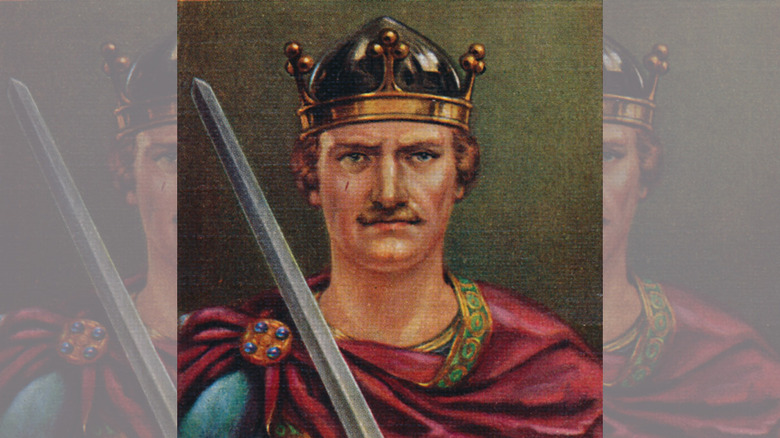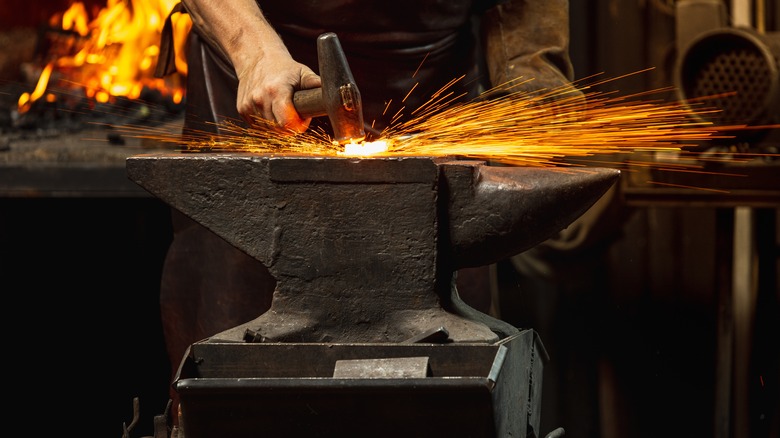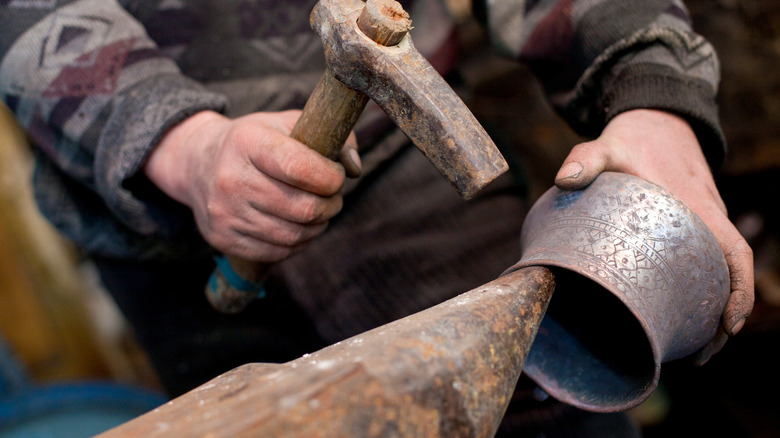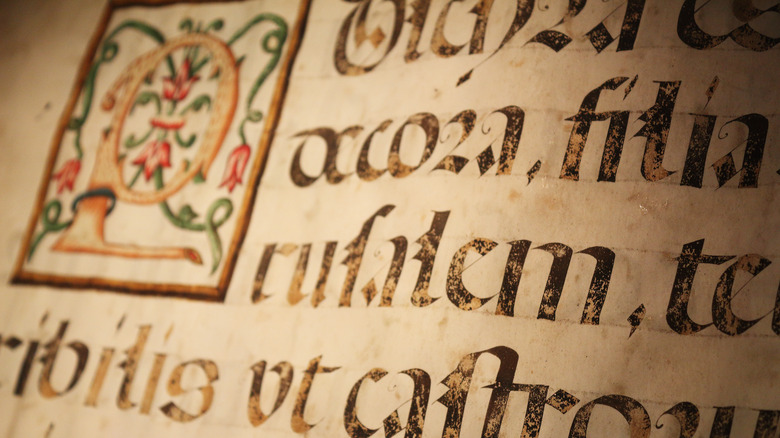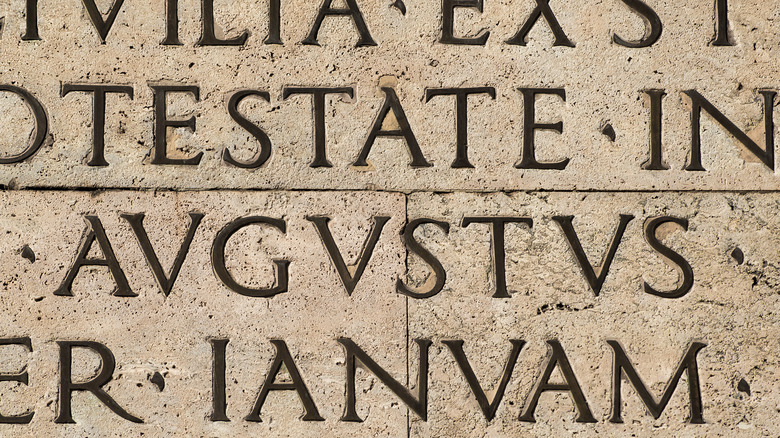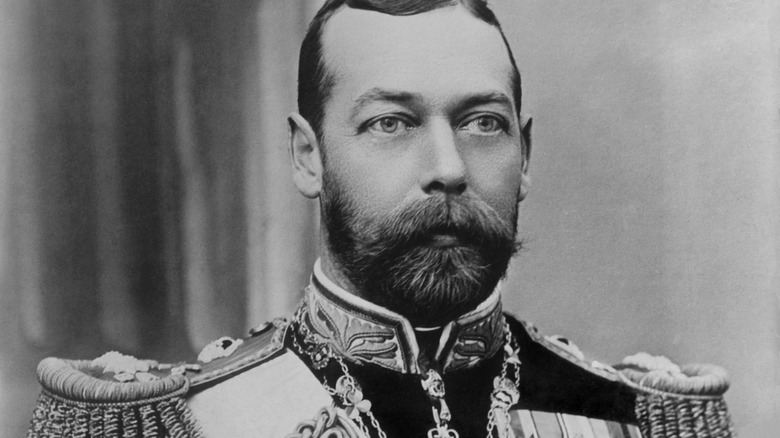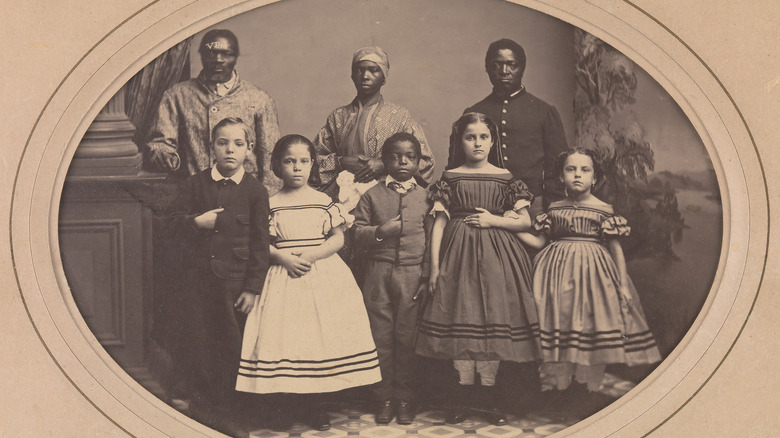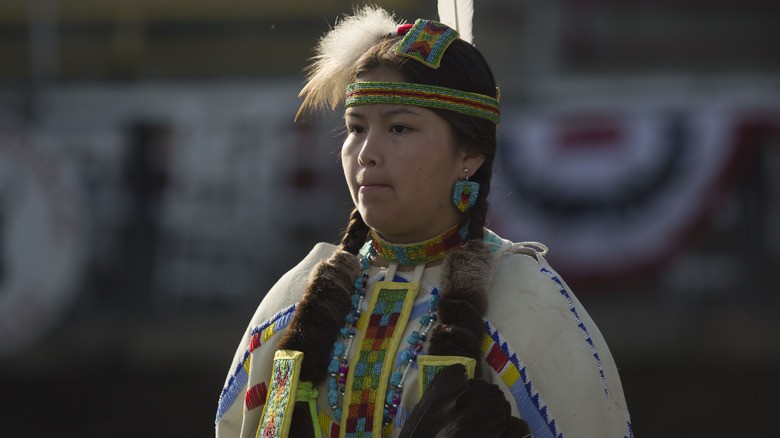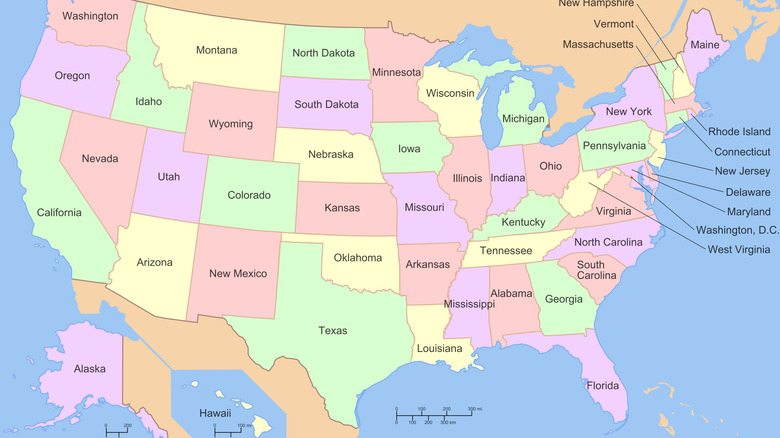This Is Why Smith Is Such A Common Surname
Our names are powerful. If someone knows your name, you're much more likely to give them your time and attention, and our names offer hints as to our upbringing and background. While our first names are important, surnames — a.k.a. last names or family names — are even more so because that's what links us to our past.
So it's always confounding when you meet someone with the same last name who is no relation to you in any meaningful sense. Meeting someone with the same last name who isn't a cousin or great-uncle or something is weird because you have no link to their past, or they to yours, rendering the experience of sharing a name kind of weird. And if you think you have it bad, consider the folks with extremely common last names in this world. There are nearly 100 million people with the surname Wang, for example, and about 40% of all Vietnamese folks are named Nguyen.
The Western world doesn't escape this problem, either. According to the U.S. Census, there are nearly 2.5 million people in America named Smith. And that's just America — Smith is the most common surname in Great Britain, Canada, New Zealand, and Australia as well. So why do so many people share a name that's become a by-word for "nondescript"? This is why Smith is such a common surname.
It starts with The Norman Invasion
While it's pretty unlikely the Normans had anyone named Smith with them when William the Conqueror invaded England in 1066, we wouldn't have so many Smiths with us today if not for the Normans.
As explained by BBC History, prior to the Norman Conquest, folks in England only had first names. Settlements were small, so someone named Henry was literally the only Henry anyone knew. When the population grew, and the possibility of multiple Henrys presented itself, people tended to be identified by their location or origin, so you might be called Henry by the River, or by their parents, so you might be called Henry, William's son. But when the Normans arrived, they introduced the concept of the surname, and it quickly caught on — in fact, BBC News notes that the Normans changed how people were named in England entirely, as people adopted Norman-style names in order to fit in with the new ruling class. What started off as a way of identifying a particular Henry became a hereditary name you inherited from your father.
Aside from their location or parentage, the other main way people gained a surname back in those days was tied to their profession. If you made beer, you probably got the surname Brewer. If you made or adjusted clothes, you probably got the name Tailor. And if you worked with metals you were probably given the name Smith.
Smithing was an incredibly important profession
You might not realize it today, but back in the Middle Ages, smithing was one of the most important professions in the world. Author Elsdon Coles Smith explains in his book "American Surnames" that every aristocratic lord had a smith in their retinue. Smiths shoed the horses, sharpened the plows, and made anything else the lord required. Smiths were vital to everyday life back in those days.
In fact, as noted by Big Think, smiths were so important they could be found in virtually every village or town in existence. In his book "What's in Your Surname?," William Lewis notes that the importance and ubiquity of smiths in the medieval world is one big reason there are so many of them today: No other name derived from a trade had the same numerical advantage. And as noted by Her, it was very common back in those days for children to take up the same profession as their father, so even before surnames were fixed in place many folks carried the name "Smith" generation after generation.
And the National Park Service explains that smiths — especially blacksmiths — were also incredibly important to the militaries of the Middle Ages. Smiths could repair and produce the tools of warfare, and Medievalists.net notes that in many cases, lords were required to bring smiths with them in order to ensure they were properly supplied for battle, meaning there was even more demand for folks called "Smith."
There were a lot of different smiths
Since Smith was originally an occupational name and smiths in general were extremely important during the period of the Middle Ages when surnames started being used and being hereditary, there were always a lot of Smiths. Another reason there were a lot of Smiths? There are a lot of different kinds of "smith."
In modern times we tend to think only about blacksmiths and possibly jewelry specialists who might be referred to as goldsmiths. But as explained by author William Lewis in his book "What's in Your Surname?," there were once many kinds of smiths who worked with specific materials or who made specific things. There were blacksmiths (according to Working the Flame, blacksmiths work with iron and steel), brownsmiths (copper), greensmiths (brass), greysmiths (lead), whitesmiths (tin), as well as goldsmiths (which is still a fairly common surname today, possibly due to the extra status conferred on people who worked with gold) and silversmiths.
Additionally, there were smiths who specialized in items instead of materials, like arrowsmiths who specialized in making arrowheads, nailsmiths who made nails, bladesmiths (who were similar to blacksmiths but incorporated leather and woodworking into their skill set to create bladed weapons), locksmiths, and coinsmiths. Considering how many subspecialties there are in the smithing world, it's actually surprising we're not all named some variation of "Smith."
For a while it was spelled Smyth or Smythe
The English language can be frustrating, and that's in large part because of its crazy evolution over the centuries. As noted by History Today, English was forever changing, and the spoken form often outpaced the written form when it came to changes, which is one reason we pronounce things very differently than they're spelled so often in this language. But the written form also changed a great deal, as there was no generally agreed-upon way to spell anything in the English language for a long time, and words drifted a lot over the years.
This was also the case with the name Smith. As noted by author Elsdon Coles Smith in his book "American Surnames," the name was originally Smith or Smithe, then shifted to Smyth or Smythe for a few centuries before slipping back to Smith, where it's stayed for the last few hundred years.
This might have simply been regional spelling variations, but according to "The Penguin Dictionary of Surnames," it might also have had to do with typesetting. As noted by Britannica, a font called Black Letter was used throughout Europe beginning in the 12th century — until everyone finally switched to something more legible, because Black Letter was very difficult to read, as many letters looked superficially the same. In the name "Smith," for example, the "m" and "i" may have been difficult to tell apart, leading to some using "y" for its better contrast.
Many cultures have a Smith
It's a fact of history that all civilizations needed smiths to work metals and other materials in order to create the necessary artifacts of daily life. So it shouldn't be surprising that as common as "Smith" is in the English language, it has many parallel names in other languages and cultures. While these names aren't always obviously related to Smith, their popularity in their native countries is due to the same reason: The smiths were very important workers that could be found in almost any settlement, and there were a lot of them.
As noted by Big Think, this includes Belgium, where a popular surname is Desmet or De Smet, which translates to "the smith," the French Lefevre or Lefebvre, which means "blacksmith," and even the Slovenian Kovačič, which means "smith" and is the third most common surname in Slovenia. There are also forms in Turkish (Demirci), Arabic (Hadad), and Gaelic (McGowan, which is the Anglicized form of Mac Gobhann or Mac Ghabhann, both of which mean "son of the smith").
And there are the more obvious variations, like the German forms Schmidt (also a common surname among Jewish people), Schmitt, Schmitz, and Schmid, as well as the Flemish version Smit, according to Ancestry.
There are also stealth Smiths
Latin may be a dead language, but it lives on in medical and scientific circles. And as noted by Britannica, for centuries, Latin was the "lingua franca" of Europe, a universally understood language that crossed borders and cultures. This explains why there are even more Smiths in the world than you imagine, because another common surname is Faber. And as noted by Big Think, Faber is actually the Latin word for "smith," which means most people named Faber have a smith of some sort way back in their family tree.
According to author Colin Rogers in his book "The Surname Detective," clerks and records-keepers in the Middle Ages might have substituted "Faber" for "Smith," possibly because there were simply too many Smiths to keep track of. In fact, Rogers merges references to Faber and Smith together because they are so closely related. And in his book "A History of British Surnames," Richard McKinley notes that Faber also has many variations, including Ferrar, Ferrer, Ferrier, Farrar, Farrow, and Faro. This means if you've ever met someone with one of those last names, you secretly met a Smith. It's possible that some of these families would be known as Smiths today if not for the creative pen of a medieval secretary.
Many Germans changed their names to Smith
America is a land of immigrants, but just about every major immigrant group that has settled in this country has experienced a period of racism and prejudice. As noted by The Library of Congress, the U.S. had a very large German population at the turn of the 20th century. And over the course of two World Wars, those German-Americans (often referred to sneeringly as "hyphens") suffered suspicion, anger, and often outright attack because of the actions of their native country. History explains that there was widespread worry that German-Americans were still loyal to Germany and might work to sabotage the United States' war efforts from within.
King George V of England actually changed the royal family name from "Saxe-Coburg-Gotha" to "Windsor" to downplay their German heritage, and in order to protect themselves, many German-Americans also sought to erase and hide their German identities. German-language newspapers disappeared, language classes ended, and German businesses closed or changed their name. According to History, towns and streets with German names were renamed — as were many German-Americans themselves. As noted by author Robert K. Murray in his book "Red Scare," in order to avoid being attacked for their German heritage, many Americans with German surnames anglicized their names — including people named some variation of Schmidt (Schmitt, Schmitz, Schmid, etc.) who chose to become Smiths. As a direct result of this prejudice and hysteria, there were more Smiths in America than ever before.
Emancipated slaves took the names of their former owners
As a country, the United States is still reckoning with the institution of slavery. The scars and reminders of that shameful period can still be seen everywhere, but one of the most subtle lies with people's surnames. Specifically, those of many Black Americans.
As noted by journalist Lolly Bowean in The Chicago Tribune, many enslaved people brought from Africa to the United States were stripped of their real names and assigned new names by their enslavers. These enslavers rarely bothered to give them surnames, but the slaves were sometimes given the same surname as the enslaver, in an attempt to mark them as property.
Facing History explains that after Emancipation, many formerly enslaved people suddenly had the ability to choose their own name for the first time in their lives. Many decided to keep their master's name — but it wasn't out of some strange affection for the people who had enslaved them; it was practical. It was a familiar and logical name that made sense, and since most newly-freed slaves were under pressure from the government to register a legal name many simply went with the names they'd been using. According to NBC News, others chose familiar and traditional American names in order to blend in. As Ancestry Blog explains, as a result, one reason there are so many Smiths in the world is because many enslaved people took the name when they left bondage.
People adopt Smith for its anonymity
As noted by Slate, "John Smith" is often used as a "placeholder" name in the modern world, a kind of generic American name that implies nothing special. When people are pressed to give a false name, there's a very high likelihood they'll use "John Smith," in part because "John" is a very common first name in English-speaking countries and "Smith" is the most common surname.
This practice is in wider use than you might think, and contributes directly to the high number of people named "Smith" worldwide. Big Think notes that the popularity of "Smith" became a self-perpetuating condition since, eventually, some people adopted the name Smith because it was so common. For example, author Graeme Davis notes in his book "Research Your Surname and Your Family Tree," that many Roma living in Western countries adopt common names, including Smith, to blend in better with the prevailing culture. This tactic was also employed by many immigrants coming into America at the turn of the century — as noted by Hollander-Waas Jewish Heritage Services, many Jewish people entering the United States found it beneficial to change their names in order to avoid prejudice, to gain employment with less trouble, and as noted by author Elsdon Coles Smith in "American Surnames," to assimilate more easily into their adopted culture — Smith is one of several popular names immigrants used to "hide" their non-Western family names.
Native Americans often adopted the name
Something that surprises many is the fact that, as Name Census reports, Smith is actually the most common surname among Native American people. Considering how different the Indigenous cultures of North America were from the European settlers who arrived here in the 17th century, it doesn't seem likely — but it does swell the numbers of Smiths living here.
One reason is that before the 20th Century, most Native Americans did not use surnames. According to author Elijah Middlebrook Haines, Native American names were typically unique and descriptive of the individual, so there was simply no need to differentiate one person from another with a surname. When Native Americans began to be assimilated into U.S. culture (often against their will), they had to come up with or be assigned a surname. Missionaries worked to convert Native Americans to Christianity, and when successful, the converted often selected a European name like Smith because it sounded more Christian.
According to Ancestry Blog, some Native Americans adopted the name Smith because it was common among the colonizers they dealt with. Many Europeans found Native American naming conventions confusing, and often mistook parts of names as surnames, so adopting the name "Smith" made interaction much more straightforward.
Smith is a name for common folks
As noted by historians Gregory Clark and Neil Cummins, common surnames in the Middle Ages often represented the socio-economic status of the person who bore them. This makes sense when you consider that the name "Smith" began as an occupational name for metal workers and other related trades. If your name was Smith, people knew immediately that you were slightly more important than many in your area, but certainly no aristocrat.
And that may be one reason there are so many Smiths: Because Smith is a name traditionally associated with people of low- or middle-class socioeconomic status. Although this has certainly changed in the modern era, where sports stars and other celebrities can be named Smith and be very wealthy, as noted by Clark in his book "The Son Also Rises," over the course of history, the name Smith is rarely associated with the elites — although this may also be due in part to people changing their name from something common like Smith or Jones when they ascend to a better life.
One fact of life is that there are always more poor and middle-class people than rich, aristocratic people, which is one reason why the Smith name has proliferated so well while more exotic names remain much less common.
Smith is spread over a large geographic area
Wherever you go in the English-speaking world, you're bound to encounter some folks named Smith. One reason for this is the fact that Smiths have settled very widely. As noted by authors Bradley Harris, Kiernan Lannon, and Joshua Ruff in their book "Smithtown," one of the earliest European settlers in North America was a man named Richard Smythe, who left Yorkshire and arrived in the Massachusetts Bay Colony in 1637, which means Smiths were among the first Europeans in America.
From there, the Smiths have spread far and wide. So far and so wide, in fact, that Voice of America reports that Smith is the most common name in 40 out of the 50 states in the U.S. (and in some of those where it's not number one, it's actually number two), and it's also the most common surname as far away as Australia and New Zealand. Being so widely spread helps keep the Smith name going, as the chances of people marrying into a Smith family are much higher.
It may not last, though. The Oregonian reports that several Latino surnames are quickly catching up to Smith in the U.S. as modern immigration affects trends. While it's unlikely we'll see the Smith surname disappear any time soon, the day may come when it's not the most common name in the U.S.

